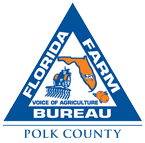A Guide to Florida Farm Bureau Policy Development

November 2023 FloridAgriculture eNewsletter
As a grassroots organization, Florida Farm Bureau’s policies start with recommendations from members at the county level. This is predominantly accomplished through sixteen commodity-based advisory committees, which are comprised of nominated members at the county-level and appointed by the organization’s state president.
Each of the committees are made up of producers, who are voting members on the committee, and industry professionals, who are non-voting technical advisors. These technical advisors serve as expert liaisons to their respective areas and guide Florida Farm Bureau’s policies through education. Technical advisors play a fundamental role in ensuring Florida Farm Bureau members are educated in industry updates to guide decisions that are made in accordance with current and scientifically-sound principles.
Once policy amendments and new resolutions are proposed at advisory committee meetings, they are presented at the organization’s Annual Meeting to be accepted or rejected by the delegate body. If a policy is accepted and deemed of national importance, it is sent on to American Farm Bureau’s Annual Meeting in January for review. Once a policy is accepted on the state level, the Legislative Affairs Division implements FFBF’s policy book on the Hill by advocating and lobbying on behalf of our membership.
 In the 2023 policy process, 23 policies were amended, one policy was removed, and eight new resolutions were accepted. These changes represent the current needs of agricultural producers in Florida and will give FFBF staff the direction they need to advocate for farmers and ranchers at the local, state, and national level.
In the 2023 policy process, 23 policies were amended, one policy was removed, and eight new resolutions were accepted. These changes represent the current needs of agricultural producers in Florida and will give FFBF staff the direction they need to advocate for farmers and ranchers at the local, state, and national level.
The post A Guide to Florida Farm Bureau Policy Development appeared first on Florida Farm Bureau.





